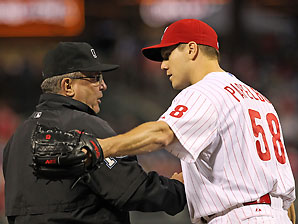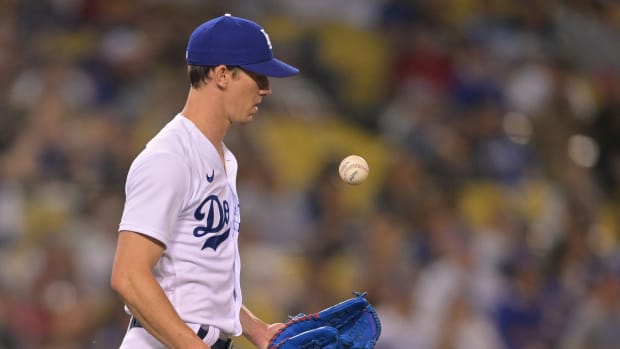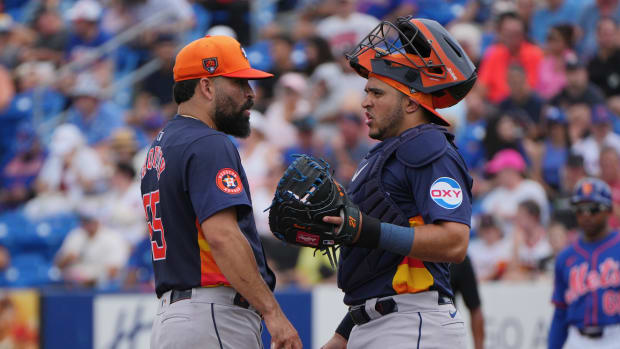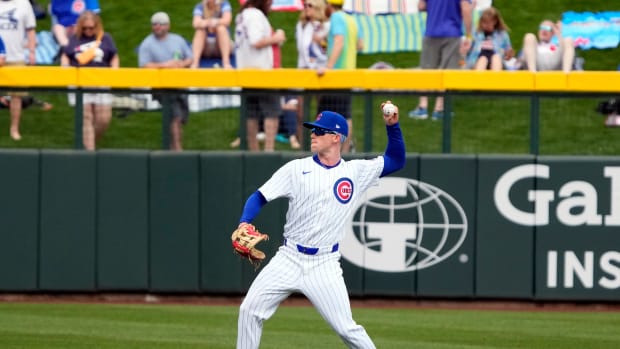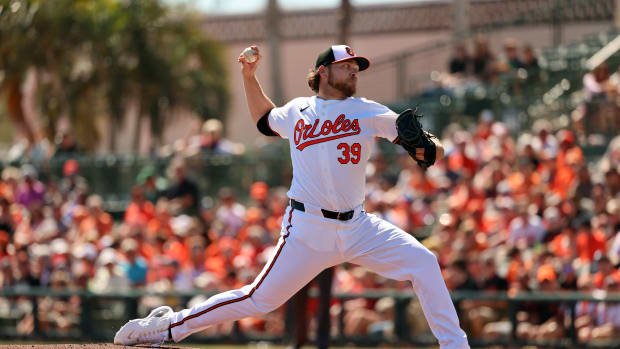Five suggestions for improving the state of umpiring
Jonathan Papelbon is far from the only player or manager to publicly call out the umpires this season. (Getty)
On Monday night in Philadelphia, Jonathan Papelbon took the loss against the Dodgers after allowing a tiebreaking run in the top of the ninth via a leadoff triple by Dee Gordon and then a single by Elian Herrera. As Papelbon walked off the mound following the third out, he confronted umpire D.J. Reyburn, a minor league fill-in who had already ejected Dodger manager Don Mattingly earlier for arguing balls and strikes. Papelbon protested that the pitch immediately preceding the triple had been strike three, and he appears to have had a point; the PITCHf/x system shows that his 92 MPH fastball ended up on the inner edge of the strike zone. "I just wanted to ask him if he could throw me out for what I was thinking,'' said Papelbon of the confrontation. "He was terrible all night. He probably needs to go back to Triple-A. If you don't do your job, you get demoted or fired. It affected the outcome of the game."
Papelbon's outburst, which will likely generate a fine from the commissioner's office, is the latest among a handful of high-profile confrontations between umpires and players or managers over the past few weeks. There's Brett Lawrie's helmet-throwing incident, Charlie Manuel's run-in with Bob Davidson, Jim Leyland's postgame tirade, Russell Martin's spat with Laz Diaz and Joe Girardi and Kevin Long's ejections by Davidson. The men in uniform are getting increasingly fed up with the men in blue, in part because they feel as though the latter aren't held accountable. Certain umpires appear to wind up at the center of controversy more often than others, with few if any public consequences for their actions. Fans who are increasingly well-armed by a variety of technological means — including super slow-motion replay on high-definition TV, the ability to view every pitch via MLB.tv, an estimate of the ball's path and location in the strike zone via PITCHf/x — can better spot umpires' glaring mistakes, yet the powers that be have been slow to deploy the tools at their disposal to minimize errors. A frustrating situation appears to have reached a boiling point.
What can be done? What follows is a five-point plan that would help the situation.
1. Expand instant replay. In 2008, Major League Baseball implemented a system for using replay to review boundary calls (home run/foul ball/in play/fan interference). Since then, the world has failed to come to an end despite protests that the game was headed toward a slippery slope in which robot umpire overlords would eventually come to rule the sport. The primary serious concern, that replay would slow the pace of the game, hasn't even come to pass. According to Baseball Prospectus' research department, the average time of a nine-inning game didn't vary by more than a full minute from 2007, the last year with no replay, through 2011, vacillating between 2 hours and 51 minutes and 2 hours and 52 minutes despite the addition of about 80 reviews per year.
The Collective Bargaining Agreement to which the owners and the players agreed last winter allows for expansion of replay to include fair/foul calls down the lines and balls trapped by fielders, but MLB couldn't get a system in place in time for the 2012 season, mainly because the umpires' union hasn't reached an agreement with MLB. Unscientific polls suggest that by a margin of at least 3-1, viewers would like to see instant replay expanded, but players have embraced it less enthusiastically, and commissioner Bud Selig has dragged his feet, citing a quaint attachment to "the human element" and "very, very little pressure from people who want to do more".
Adding replay on so-called "bang-bang" plays at any base, or at least at home plate, would be a major improvement. So would a system allowing one challenge per game (and an additional one for extra innings) that would allow managers to make sure umps get high-leverage calls right.
Having replay as a backup system might defuse the tension on the field by relieving the umpires of the burden of perfection on every play. Perhaps more importantly for the umpires' union, the addition of "eye in the sky" umpire personnel would mean additional jobs —like a fifth member for every umpiring crew who could sit in the press box and utilize the numerous replays at his disposal to render a quick and fair judgment when needed.
2. Make umpires more accountable for mistakes. With or without replay, umpires are going to make mistakes. Last week, the Red Sox benefitted from an incorrect overturned call to keep a rally alive that led to three runs in a 7-4 win over the Tigers. After the game, Detroit manager Jim Leyland, who was ejected after arguing the call in question -- a strike three that turned into a phantom foul ball upon appeal -- unleashed a postgame tirade directed at the umpires. Said Leyland, "We're all accountable in this business… and when I say all of us, I mean everybody that's involved in the game needs to be held accountable. That's exactly what needs to be done… There should not have been a rally in that inning. Now anybody that saw that, have the nerve to write what you saw and say it, because I'm not going to sit here and rip umpires."
If Leyland or Papelbon has to face the music after a ballgame and answer tough (or softball) questions from reporters about what happened, why shouldn't Reyburn, or Bill Welke, who overruled home plate umpire Jeff Nelson's strike call in that Tigers-Red Sox game? Beyond that, why should umpires who are more mistake-prone be retained? There is an internal review system in place to judge umpires but it is not made public. Whether it's a report card or a numerical grade or a tally of egregious errors, umpire performance should be subject to public scrutiny, and the worst offenders should be either fired, demoted to fill-in status or relegated to the "fifth ump" role described above.
3. Make umpire discipline more transparent. Last month, Bob Davidson was suspended for a game by MLB following an extended nose-to-nose confrontation with Phillies manager Charlie Manuel, on the grounds of "repeated violations of the Office of the Commissioner's standards for situation handling." The suspension was the first for an umpire since 2008, when Brian Runge was suspended for one game after bumping into Mets manager Jerry Manuel during an argument. In 2007, umpire Mike Winters was suspended for the final week of the season after escalating an argument with the Padres' Milton Bradley, but before that, you'd have to go back to 2003, when Bruce Froemming and John Hirschbeck were suspended for 10 days due to separate off-field incidents involving comments they made to senior officials.
Umpires have almost certainly merited more suspensions than those for their parts in escalating confrontations. We know that they're occasionally fined, though such information rarely becomes public knowledge, with the 2010 fining of Joe West the exception that proves the rule. If MLB sees fit to dock an umpire money for stepping over the line, the public has a right to know.
4. Revamp the postseason assignment process. The selection of umpires for playoff and World Series assignments is supposed to be on merit, but back in 2009, during a postseason riddled with game-turning umpire mistakes, one longtime umpire confided that politics play a role in the selections.
Meanwhile, some of the umpires ranked as the worst by players continue to draw October assignments. A 2011 Sports Illustrated poll of anonymous players named West, C.B. Bucknor, Angel Hernandez, Davidson and Derryl Cousins (who interceded in the Papelbon fray) as the game's five worst umpires, with West drawing an overwhelming 41 percent of the vote. Bucknor, West and Hernandez were named the three worst in a 2010 ESPN poll, and their names have popped up on such lists for most of a decade. Cousins worked in the postseason as recently as 2008, Davidson and Bucknor as recently as 2009, and West and Hernandez did so last year.
One solution would be to allow players, managers and coaches -- those who have the most at stake in the postseason -- some voice in how umpires are chosen for the season's most important games. While it's true that such processes can have its pitfalls — look no further than the Gold Glove voting — it would almost certainly eliminate the presence of those umps who consistently rate among the worst in the game.
5. Reduce umpire workloads by expanding the pool of umpires. The baseball season is a grind, one that includes not only the six-month regular season but also around a month of spring training exhibitions and another month of the postseason. While players based in a given city spent roughly half their season on the road, umpires, even if they live in a major league city, don't enjoy nearly the same number of home games. They spend most of the season living out of a suitcase, sleeping in a hotel bed and — judging by their physiques— not eating healthily or getting enough exercise. Reducing their travel by employing a larger pool of umpires would lower their stress levels and allow them to take better care of themselves.
Obviously, the most stressful umpiring position is home plate. Last year, 83 umpires called balls and strikes at least once. Out of a possible 40 or 41 home plate assignments (one every four games on a four-man crew), West worked the most often, at 36 times. Another 52 umpires worked the plate between 32 and 35 times, with 19 working between 24 and 31 times, six working between 11 and 21 times, and five working fewer than 10 times. The top 75 umpires in terms of workload — enough to staff a full slate of 15 games in one day, with one alternate per crew — averaged 31 assignments while covering 96.5 percent of all games. Even assuming some turnover via the elimination of the worst umpires and the promotion of new ones from the minor leagues, redistributing the number of assignments to cut down on the heaviest workloads should be feasible.
(For a full breakdown of how many games each umpire has worked behind the plate and in total for the 2011 and 2012 seasons, click here.)
New equipment, additional staff and increased training won't come cheap, but the game has enjoyed unprecedented economic growth on Selig's watch. Improving the quality of umpiring is a direct investment in improving the on-field product. It's also worthwhile for the long-term health of the game.
--
Thanks to Bradley Ankrom of Baseball Prospectus for research assistance.






























